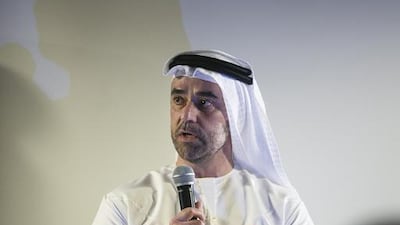ABU DHABI // It's OK to be Muslim and hold doubts. That's the message Omar Ghobash, author of Letters to a Young Muslim, delivered on Saturday to a packed audience at the MoxieZone in twofour54 media zone.
“Every child has asked their parent or a teacher, what does God want? How do you know God exists?” said Mr Ghobash. “We shouldn’t be afraid of very simple questions.”
Mr Ghobash, UAE Ambassador to Russia, wrote the book for his sons Saif, 16, and Abdullah, 12, as they were starting to deal with some of the same questions he faced at their age.
“I am also addressing the kinds of worries and fears that I had when I was 15 and I wish somebody had been able to tell me and I’m now telling my son,” he said. “I think these issues are very common not only just to youth, but the region.”
One of the key messages Mr Ghobash wanted to get across to his sons’ generation was “not to feel ashamed for being a human being who reacts with disgust towards certain things and with pleasure at other things”.
Mr Ghobash said he also encouraged young people to think critically and ask questions.
“It is possible in this world to be a Muslim and to believe all kinds of things,” he said.
Too often, when adolescents reach their late teenagers and early 20s, they begin to swing on a moral pendulum from “very devout” to “very decadent” with no middle ground because of a strict culture in Islam.
“If you are not perfect, if there is just this tiny little bit of doubt, then you are stained forever. I try to work out a middle ground.
“We’re allowing our religious scholars to promote this idea that faith is this kind of thick substance that passes all the way through your life. If at any point it becomes thinner, you must be punished for that.”
Under such strict interpretation, some young Muslims may be inclined to resist asking questions.
Allowing them to raise questions would foster an open dialogue to promote better understanding, Mr Ghobash said.
“I watched some of these wonderfully intelligent and highly educated religious scholars talking about people like me, who haven’t got the traditional knowledge, as people who must be told what to do,” he said.
“I think they need to realise that knowledge has increased to such an extent that people like you and I are able to equip themselves with enough ethical knowledge, philosophical knowledge and psychological knowledge to be able to engage at a higher level with the same religious scholars.”
Mr Ghobash said he held a “great deal of respect” for religious scholars, calling them “vital partners in helping us to move forward”.
“If we had clerics in our part of the world also accepting that there are other disciplines outside of the strictly theological discipline that they master, that can complement and inform their positions, then maybe we’re going to be at a better dialogue,” he said.
The idea that questioning authority is wrong is “way out of date”.
“Questioning leadership does not lead to complete breakdown of society,” said Mr Ghobash. “I think we should be talking about constructive criticism, how to take interesting situations, dismantling them intellectually and then rebuilding them in a more interesting fashion.”
Audience members were enthralled throughout the discussion.
Sana Bagersh, chief executive and managing director of Brand Moxie, an advertising and marketing agency, said: “He is just so relevant in terms of what’s going on right now and his book is just so insightful.
“He is an important voice with all that is happening with the current political situation, the upheaval that we are seeing, the social and political upheavals that we see.
“We need people that bring people together, people who understand the nuances of social and religious and political streams and Omar Ghobash is somebody who’s very lucid in his thinking, his background as well.
“His ideas are very refreshing. We need ideas that talk about inclusiveness and are about tackling issues as they are.”
A Vibrant Discussion with Omar Ghobash: On Life's Challenges and his Vision of Hope was hosted by Tamakkan in cooperation with AmCham Abu Dhabi.
The discussion was moderated by The National's chief columnist Faisal Al Yafai.
rpennington@thenational.ae

